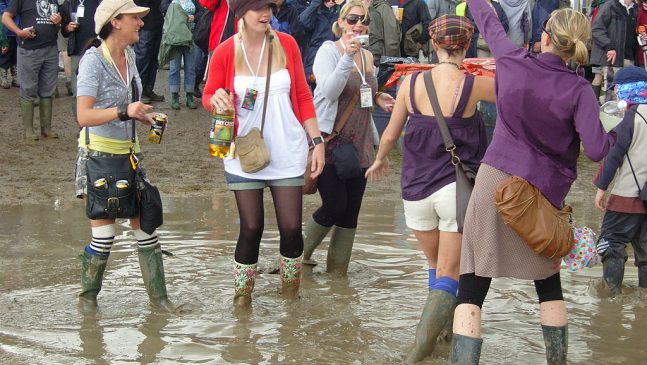Steve Taylor is an environmentalist and economic development advisor who specialises in developing and implementing sustainability projects. Well known for his work with music festivals, he has been Sustainability Manager for events such as T in the Park, Lake of Stars Festival Malawi, Glasgow’s Commonwealth Games Festival 2014 and Stornoway’s HebCelt festival, securing Greener Festival awards for each event. Steve will be heading up the Water chapter in the new Show Must Go On report – part of Festival Vision:2025. You can help fund the project at www.crowdfunder.co.uk/festivalvision2025
Encourage festivalgoers to drink water, but don’t waste it!
For some festivals there may be access to a water main. Scotland’s T in the Park had one installed as part of the development of their new site at Strathallan in 2015 and this enabled a series of standpipes to be installed where festival goers could fill reusable bottles with free water. Taps were push types with evidence showing that while a 3 second flow with ‘automatic turn off’ works well in bathrooms, the ‘hold in’ type work better at standpipes. If bottles are being filled from standpipes, the tap should not flow after the bottle is full so a push on/release off type is better than the 3 second flow type. This prevents not just wastage but spillage to ground causing mudpools.
Where water mains are not available, festivalgoers are increasingly encouraged to bring their own bottled water. While plastic water bottles were popular in the past the drive to reduce single use plastic has made these unsuitable but many festivals now encourage the use of reusable water cups/bottles. One of the best schemes is run by FRANK water at numerous festivals. They provide unlimited free refills of chilled filtered water to anyone who buys one of their reusable bottles. Health and Safety may oppose stainless steel bottles on the grounds they might be a weapon so event mangers need to be aware of the nature of their audience before specifying bottle type.
Onsite water covers not only drinking water but water for toilets, washbasins and perhaps showers. Water use can be saved through utilising grey water. Toilets can be flushed with grey water from showers or primed with harvested rainwater, while compostable toilets eliminate water demand providing a potentially massive saving of water.
Too dry / too wet, and we can’t control the weather
In the UK we’re used to rain and a wet weekend at a festival. But some years it may be too dry! Dust can be created at levels that exceed health and safety limits, especially during the build period when heavy vehicles may help generate dust particles. Site roads can be damped with sprayed water to reduce dust nuisance, but this may have to be cleared with the environmental regulator first, especially if it involves water abstraction from a local river. But in very wet years, even the best drainage might fail if the water table is too high and there’s nowhere for standing water to drain away to.
The best organised festivals understand how their drainage is likely to act before the event starts. Many Scottish festivals, used to heavy rainfall, monitor the rainfall on (or near) site for four weeks beforehand. Comparing this to historical rainfall data for the area (usually by checking rainfall records for the past 20 years) will let organisers know if they are in a wet, medium or dry year. Or a very wet year. If its very wet (higher rainfall than three quarters of the previous 20 years) then drainage will probably fail, and a contingency based on pumping water off site may be needed. Again permission may be needed from the environmental regulator to find a suitable location to eject gulped water as it could effectively create a new lake. Water can be gulped and moved by a waste water lorry, so remember to keep one clean for this purpose if you’re encountering a very wet year!
Protecting our water courses
With so many festivals taking place in our beautiful countryside, we’re all keen on the mantra of leave no trace, but this doesn’t just apply to clearing waste and litter. It also means protecting our water courses from sewage, litter, and festival goers urinating in streams. With the Environment Agency successfully prosecuting a major festival in 2015 for polluting a local river, promoters should be more aware. But…. A recent survey asking festival organisers about conservation measures, only 2% of the responses considered water conservation. And returning to that prosecution, the river recorded ammonia levels over 60 times greater than allowable limits, leading to extensive fish kill.
Finally control of the products we use can help our water management. Eco friendly cleaning products reduce the need for high volume dilution, water conditioning can minimise detergent requirements while foam soap needs less water than gel based products – and generally is likely to have lower levels of microplastics.”
Check out the Festival Vision:2025 crowdfunder campaign video below to see how you can support the festival industry to come together around a vision of sustainable events – researching best practices and innovations and creating up-to-date resources, like The Show Must Go On edition 2, to help event organisers cut their environmental impacts: www.crowdfunder.co.uk/festivalvision2025

